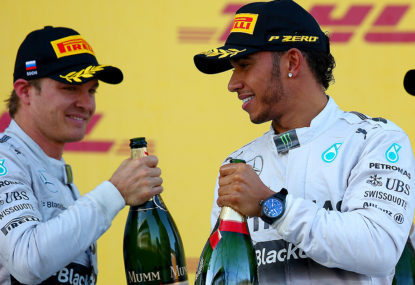Fernando Alonso's future is secure, now it's Lance Stroll's time to deliver for Aston Martin
It’s time that serious questions are asked of his Lance Stroll and his future in the team.

There’s been a lot of complaining about the current Formula One product. While are a lot of good points have been raised, here are five alternative reasons why Formula One really ain’t so bad.
1. The Hamilton-Rosberg rivalry
I hear you all letting out a collective groan due to the constant Mercedes one-two finishes that make every race predictable. But bear with me!
What makes any class of racing a great product is its rivalries; whether it be the WRC of the late 1990s, the 500cc Superbikes of the ’80s or NASCAR of the Dale Earndhart era.
Racing, and sport in general, is defined by rivalries. Obviously some are better than others, but rivalries nonetheless create exciting racing and tell a story on the track. It gives the fans someone to cheer for as they try to take down their enemy and claim the glory.
Especially over the latter half of this season, Lewis Hamilton and Nico Rosberg crossed paths in increasingly negative ways. One just has to look at Rosberg’s hat-throwing dummy-spit after conceding the World Championship to see how much animosity is in the air between the two, despite sharing a garage.
It makes you want to see what happens next; who will win the next race? Will they collide on the track if things get heated? Who’s going to throw the next interview-induced insult?
You want to watch not just the racing, but the related products involved with Formula One to see how it pans out.
2. The (near) mechanically perfect cars
Comparing cars and drivers across eras and decades opens a can of worms, but in terms of pure mechanical structure, the cars in this modern era are simply the best of all time.
They’re the fastest, most powerful, most economic, best gripping, safest (which is the most important), best handling, greatest overall machines in the history of the sport, simply due to modern technology.
A race 30 years ago was a slower, fuel-burning, ozone-killing race of unstable machines in comparison to today’s product.
People watch any form of racing for the high-octane action, and at no point in Formula One history have the cars been faster and more powerful.
3. All these dastardly rules and regulations changes
Rules and regulations changes have been more common than Mercedes victories in recent years, but that isn’t necessarily a bad thing.
The need to evolve and advance towards the future is all about experimentation. The same applies to Formula One racing.
Despite some changes not being the greatest of decisions, they are decisions that need to happen if Bernie Ecclestone wants to evolve his product.
It’s all about trial and error and the wrong regulation or rule change will only result in another change that will be the right one. All these changes will only benefit Formula One in the long term and build towards a better era of racing.
4. The amount of promising young drivers
Formula One is constantly in a state of change and evolution, which is why the number of great young drivers coming through is fantastic.
Valterri Bottas, 26, Sebastian Vettell, 28, Daniil Kvyat, 21, Daniel Ricciardo, 26, Sergio Perez, 25, Nico Hulkenberg, 28, Roman Grosjean, 29, Max Verstappen, 18, Felipe Nasr, 23, Carlos Sainz, 21, Marcus Ericsson, 25, Kevin Magnussen, 23. All under the age of 30 and fighting to earn their spots.
The sheer amount of young talent can only be a good thing for the sport.
5. The mix of old and young drivers
Speaking of age, the current mix of up-and-comers and experienced heads is another reason why the current product is great.
As previously mentioned, the talent pool of young drivers is great, but the need for experience in the paddock is just as important – not only for the quality of racing, but also the younger guys’ progression.
With the majority of the veterans and former world champions like Hamilton, Rosberg, Jenson Button, Kimi Raikonnen, Fernando Alonso and Sebastian Vettel running at the top of the leader board, the championship benefits from guys who’ve been through the ringer and know the ins and outs of the tracks – and it shows with the results.
The young drivers, especially when teamed with the seniors (because they are just that old), learn not just the racing aspects, but also the psychology and strategy of the sport.
Unless you are Sebastian Vettel teaming with Mark Webber.